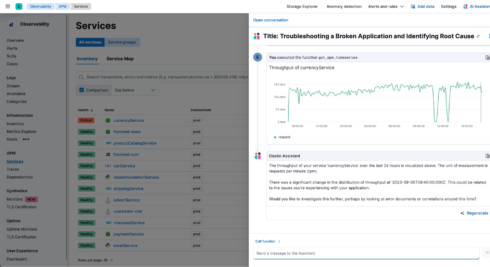
Elastic has announced the launch of an AI assistant for its observability offering, along with the general availability of Universal Profiling, which provides visibility into everything in cloud-native environments, including applications, services, and infrastructure.
According to Elastic, the new AI assistant will enable IT teams to more quickly resolve issues. It makes use of generative AI and proprietary data in order to provide context-aware and accurate remediation recommendations. This helps reduce the learning curve for IT professionals as it helps them understand application errors, log message interpretation, alert analysis, and suggestions for improving code efficiency.
The AI assistant also has the ability to learn and improve over time, based on scenarios it faces. IT teams can also teach it about specific problems and steps for resolution so that it can make appropriate recommendations when it comes across that problem in the future.
“With the Elastic AI Assistant, SREs can quickly and easily turn what might look like machine gibberish into understandable problems that have actionable steps to resolution,” said Ken Exner, chief product officer of Elastic. “Since the Elastic AI Assistant uses the Elasticsearch Relevance Engine on the user’s unique IT environment and proprietary data sets, the responses it generates are relevant and provide richer and more contextualized insight, helping to elevate the expertise of the entire SRE team as they look to drive problem resolution faster in IT environments that will only grow more complex over time.”
The next announcement is the general availability of Universal Profiling. This new solution helps IT teams pinpoint bottlenecks so they can resolve issues faster.
It profiles every line of code in a system to provide deep visibility into application code and third-party libraries in use.
Universal Profiling measures code efficiency in three metrics: CPU utilization, CO2, and cloud cost.
“Universal Profiling provides unprecedented visibility into the runtime behavior of all applications: it builds stack traces that go from the kernel, through userspace native code, all the way into code running in higher level runtimes, enabling you to identify performance regressions, reduce wasteful computations, and debug complex issues faster,” Elastic wrote in a blog post.








